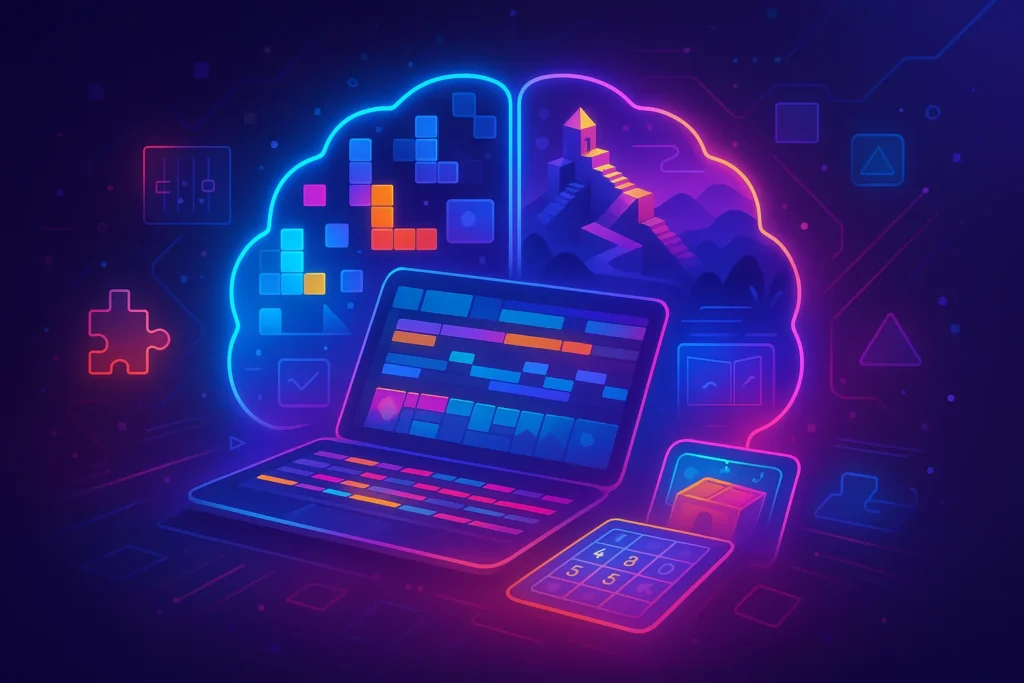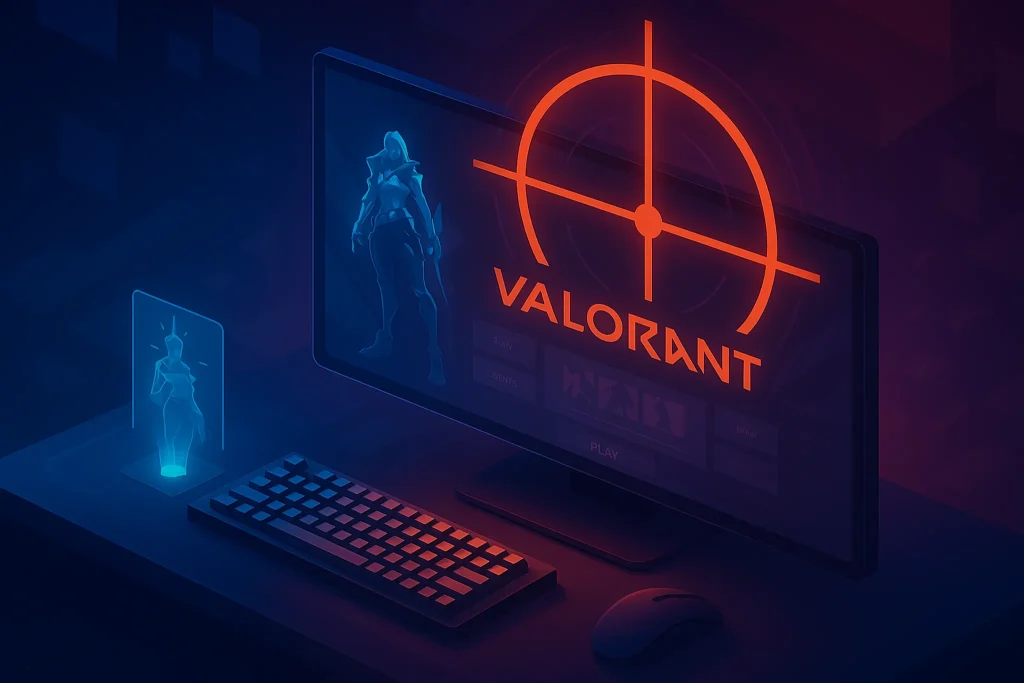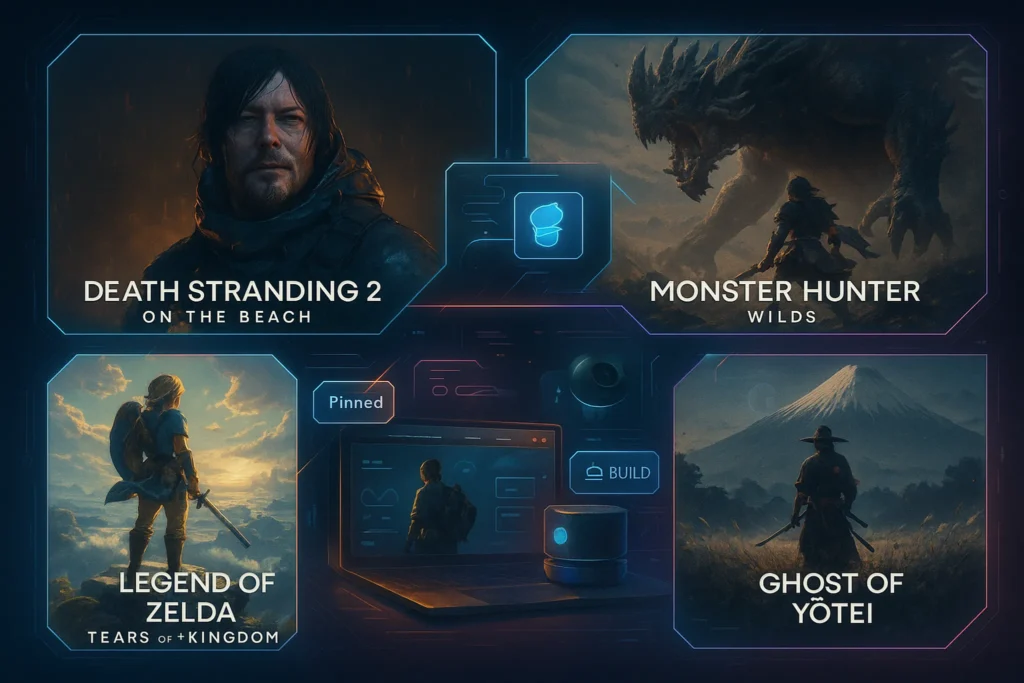Introduction: Why Puzzle Games Matter
Puzzle games have always been more than just a pastime. They sharpen cognitive abilities, challenge problem-solving skills, and even reduce stress by immersing players in engaging mental exercises. In 2025, the genre has expanded beyond simple crosswords or number grids—now encompassing visually stunning adventures, neuroscience-backed apps, and logic-bending experiments that feel like brain workouts in disguise.
From improving short-term memory to enhancing creativity, puzzle games deliver tangible mental benefits. They also fit seamlessly into modern lifestyles: five-minute mobile sessions for commuters, immersive console puzzlers for evenings at home, or quick daily brain teasers that replace idle scrolling.
This guide covers the best puzzle and brain training games worth your time in 2025, spanning mobile, PC, and console platforms. Each entry offers unique ways to flex your brain—whether you’re after memory exercises, logic tests, or creative storytelling.
💡 Think of puzzle games as gyms for the mind—accessible, fun, and endlessly rewarding when played consistently.
Lumosity: The Classic Brain Training App
Launched over a decade ago, Lumosity remains one of the most trusted brain training platforms. Its mini-games target cognitive skills like memory recall, attention, problem-solving, and mental flexibility. In 2025, Lumosity continues to evolve with adaptive difficulty, ensuring the exercises stay challenging as your brain gets sharper.
What makes Lumosity stand out is its scientific foundation. Designed with input from neuroscientists, the app translates cognitive training into fun daily tasks. For busy professionals or students, its five-minute sessions fit perfectly into breaks, offering a quick brain reset.
Beyond individual play, Lumosity now integrates leaderboards and community challenges, adding a competitive edge that motivates consistent training.
Peak: Neuroscience-Backed Training
If Lumosity is the pioneer, Peak is the ambitious rival. With over 40 mini-games, Peak emphasizes variety. Categories include memory, attention, language, and problem-solving. Each game adapts in difficulty, tracking progress over time with personalized “brain maps.”
What sets Peak apart is its scientific partnerships. The app collaborates with researchers to validate its effectiveness, giving it credibility as more than entertainment. Users can even access “Coach” features for curated workout plans targeting specific skills like concentration or emotional regulation.
Peak feels less like a game collection and more like a personalized training plan—perfect for users who want measurable progress rather than casual distraction.
Monument Valley: Beautiful Spatial Puzzles
Not all puzzle games focus purely on cognitive metrics. Some engage creativity and spatial awareness. Monument Valley, a mobile classic, remains timeless in 2025. With its surreal, Escher-inspired architecture, players guide characters through impossible structures, manipulating perspectives to uncover hidden paths.
The genius of Monument Valley is how it makes problem-solving feel artistic. Instead of raw numbers or memory drills, it engages visual-spatial reasoning and creativity. Each level is like walking through a piece of interactive art.
For mobile gamers who crave beauty alongside brain training, Monument Valley is unmatched. It’s also a stellar reminder that puzzle games can be both meditative and intellectually stimulating.
While puzzle-solving with friends is fun, some of the most rewarding co-op experiences are designed specifically for two players. Our feature on Best Co-Op Games for Couples: Play, Bond, and Level Up Together highlights titles like It Takes Two and Unravel Two that blend emotional storytelling with teamwork.
The Witness: Exploration Meets Deep Puzzles
Jonathan Blow’s The Witness is a modern masterpiece of puzzle design. Set on a mysterious island, players encounter hundreds of environmental puzzles, each teaching new logic without explicit tutorials.
The Witness emphasizes learning through experimentation. Early puzzles start simple, but later ones push logical reasoning and pattern recognition to new heights. It’s as much about patience and observation as it is about intellect.
For those who want long, immersive sessions, The Witness is a top pick. Unlike mobile apps, it demands full attention, rewarding persistence with moments of pure “a-ha!” clarity.
Tetris Effect: The Timeless Puzzle with a Twist
Few puzzle games are as universal as Tetris, and Tetris Effect reinvents the classic with mesmerizing visuals and soundscapes. Every piece placement syncs with the music, turning gameplay into a meditative flow state.
While the mechanics remain familiar—stacking blocks to clear lines—the audiovisual layer transforms it into an almost therapeutic experience. Studies have even suggested that Tetris can reduce intrusive thoughts and improve focus.
Tetris Effect bridges entertainment and mental training beautifully, showing how repetition and rhythm sharpen reaction time and pattern recognition.
Portal & Portal 2: Logic-Based Classics
Valve’s Portal series is legendary for a reason. Using a portal gun, players solve 3D puzzles that test spatial reasoning, logic, and creativity. Each chamber forces you to rethink physics and problem-solving.
What makes Portal shine is its humor and narrative. As you work through puzzles, GLaDOS (the AI overseer) delivers witty commentary, making the experience as entertaining as it is intellectually stimulating.
Even in 2025, Portal remains a benchmark for puzzle-based design. It’s a must-play for gamers who enjoy challenges that reward lateral thinking as much as raw logic.
Brain Age: Nintendo’s Legacy Trainer
Nintendo’s Brain Age series introduced millions to the idea of “brain training.” On Switch, its modern iterations retain the charm of quick exercises in math, memory, and reflex.
Brain Age succeeds because it gamifies improvement. Daily training streaks, competitive score-sharing, and bite-sized exercises make it both engaging and effective. It’s less about deep puzzle immersion and more about consistency.
For families or casual gamers, Brain Age is a friendly, accessible way to keep the brain active while enjoying Nintendo’s polished presentation.
Sudoku & Crossword Apps: Mobile Staples
Sometimes, the classics are unbeatable. Sudoku and crosswords remain staples of mobile gaming. With endless variations, difficulty settings, and daily challenges, they provide evergreen brain training.
Sudoku develops logical sequencing and pattern recognition. Crosswords boost vocabulary, memory recall, and language flexibility. Together, they represent timeless mental workouts that adapt seamlessly to digital formats.
Modern apps add features like hints, progress tracking, and multiplayer challenges, keeping these traditional puzzles fresh. For daily training, they’re hard to beat.
Gorogoa: Artistic Storytelling Through Puzzles
Gorogoa redefines what puzzle games can be. Instead of standard levels, it presents panels of hand-drawn art that players rearrange and interact with to solve surreal puzzles.
This artistic approach engages creativity as much as logic. It feels less like a game and more like an unfolding storybook where every solution advances the narrative. Gorogoa is ideal for players who value emotional engagement alongside mental exercise.
📬 Want More Gaming Insights?
Join our free newsletter and get weekly updates on the best puzzle games, mobile strategies, and gaming tech shaping 2025.
No spam. Just smart tips for sharper play.
🔐 100% privacy. No noise. Just value-packed gaming insights from NerdChips.
Baba Is You: Rule-Bending Logic
Among modern indie puzzle hits, Baba Is You stands out. Instead of fixed mechanics, it lets players manipulate the very rules of the game by rearranging text blocks. For example, turning “Wall Is Stop” into “Wall Is Move” changes how the world behaves.
This mechanic challenges players to think outside the box—literally redefining problem-solving parameters. Baba Is You isn’t just about solving puzzles; it’s about redefining how puzzles themselves function.
For those who love creativity and experimentation, it’s one of the smartest games available today.
👉 For a look at what else indie developers are delivering, explore our list of the Most Anticipated Indie Games of 2025.
🎨 Quick Comparison Table
| Game | Platform | Type | Best For |
|---|---|---|---|
| Lumosity | Mobile (iOS/Android) | Brain training app | Memory, focus, daily use |
| Peak | Mobile | Brain training app | Attention, concentration |
| Monument Valley | Mobile | Spatial puzzle | Creativity, relaxation |
| The Witness | PC/Console | Exploration puzzle | Logic, patience, problem-solving |
| Tetris Effect | Multi-platform | Classic puzzle | Focus, reaction time |
| Portal/Portal 2 | PC/Console | Physics logic puzzle | Spatial reasoning, creativity |
| Brain Age | Nintendo Switch | Training exercises | Quick daily brain boosts |
| Sudoku/Crosswords | Mobile | Classic puzzles | Logic, vocabulary, memory |
| Gorogoa | PC/Mobile/Console | Artistic puzzle | Creativity, storytelling |
| Baba Is You | PC/Console | Indie logic puzzle | Rule-bending, lateral thinking |
🎨 Cognitive Skills Checklist
5 Cognitive Skills Puzzle Games Can Improve:
-
✅ Memory: Remembering sequences, vocabulary, or visual cues.
-
✅ Logic: Applying reasoning to deduce correct solutions.
-
✅ Focus: Sustaining attention through complex challenges.
-
✅ Creativity: Thinking outside the box with abstract puzzles.
-
✅ Problem-Solving: Approaching challenges from multiple angles.
📌 Regular puzzle play doesn’t just entertain—it genuinely strengthens these mental muscles over time.
The Science of Brain Training
Puzzle games are not just entertaining diversions—they tap into the science of how our brains learn, adapt, and grow. Research in cognitive psychology and neuroscience shows that engaging in problem-solving activities strengthens neural connections and even fosters neuroplasticity, the brain’s ability to reorganize itself.
Games like Sudoku or Lumosity don’t “make you smarter” in a general sense, but they do train specific skills like working memory, attention control, and pattern recognition. Over time, this translates into sharper focus at work, better multitasking, and improved learning speed.
It’s also worth noting that puzzle games act as stress relievers. By channeling attention into structured problem-solving, they reduce mental clutter and promote mindfulness. In short, playing puzzles consistently can be as beneficial to your brain as exercise is to your body.
Choosing the Right Puzzle Game for You
Not all puzzles are created equal, and the best game for you depends on your goals and personality. If you want to boost creativity, games like Monument Valley or Gorogoa immerse you in artistic, abstract problem-solving. If you thrive on fast-paced competition, Tetris Effect or Portal will challenge reflexes and spatial logic.
For those who prefer structured routines, apps like Lumosity or Peak provide daily “workouts” designed for gradual improvement. Meanwhile, classics like crosswords and Sudoku appeal to traditionalists who enjoy clear rules and logic.
💡 The key is alignment: choose games that feel enjoyable, not just “good for you.” That way, you’ll actually stick with them long enough to see the benefits.
Daily Routine Integration
Puzzle games deliver the most impact when woven into your daily routine. Think of them like exercise—short, consistent practice beats occasional marathons. For example:
-
Morning commute: Play Lumosity or Peak for a five-minute focus boost.
-
Afternoon break: Clear a few Sudoku grids to refresh mental clarity.
-
Evening downtime: Relax with Monument Valley or Gorogoa for creative stimulation.
This rhythm ensures your brain gets a variety of challenges throughout the day. Over time, the habit of integrating puzzles into micro-moments makes them as natural as checking messages—except they add lasting cognitive value.
Community & Multiplayer Puzzle Games
While many puzzle games are solo experiences, the social dimension shouldn’t be overlooked. Multiplayer options like Words With Friends or cooperative escape-room apps turn problem-solving into a shared activity.
This social angle adds motivation. Competing with friends in wordplay or collaborating on a logic puzzle makes the experience stickier and more rewarding. Beyond fun, these multiplayer puzzles also build communication and teamwork skills—reminding us that brain training isn’t just individual, but can be relational too.
For players craving community-driven challenges, online leaderboards and puzzle tournaments provide that competitive edge, ensuring the brain workout never feels lonely.
Accessibility & Inclusivity in Puzzle Games
A strength of the puzzle genre is its accessibility. Many games are designed with adjustable difficulty, customizable fonts, and high-contrast visuals to support players with vision impairments. Audio cues and haptic feedback further expand inclusivity for diverse audiences.
Apps like Sudoku.com or Lumosity now include accessibility settings to make brain training available for older adults or people with learning differences. This democratization of cognitive play ensures puzzle games can reach anyone, regardless of age, skill level, or physical ability.
Puzzle games, when inclusive, serve as bridges—welcoming everyone to engage with brain training in ways that work for them.
The Future of Puzzle Games
Looking ahead, puzzle gaming is poised to evolve with new technologies:
-
AI-Personalized Puzzles: Future apps may analyze your play patterns and generate puzzles tailored to your weak spots, creating truly adaptive brain training.
-
VR/AR Experiences: Imagine solving 3D spatial puzzles in virtual environments or using augmented reality to overlay challenges onto your living room.
-
Biofeedback Integration: Some prototypes already adapt puzzles based on your heart rate or stress levels, adjusting difficulty dynamically to balance engagement and relaxation.
These innovations suggest that puzzle games will remain not just relevant but central to how we train and entertain our brains in the coming decade.
🚀 In short: the future of puzzle gaming is immersive, personalized, and smarter than ever.
Nerd Tip: Balancing Fun and Challenge
The best brain training comes when puzzles hit the “sweet spot”—challenging enough to stretch your skills, but not so frustrating that you quit. Rotate between quick daily exercises (Lumosity, Sudoku) and deeper puzzles (The Witness, Portal) to balance variety and difficulty.
👉 For casual players wanting smoother experiences, don’t miss our guide on Top 10 Free-to-Play Games That Aren’t Pay-to-Win.
🧠 Nerd Pick
Want to play smarter while training your brain? Many of these puzzle games are available via App Store/Google Play gift cards, Nintendo Switch eShop, or even Xbox Game Pass, which bundles classics like Tetris Effect and Portal.
👉 Grab your game gift cards and subscriptions here
🧠 Nerd Verdict
Puzzle games have never been stronger than in 2025. From neuroscience-backed apps like Lumosity and Peak to creative masterpieces like Baba Is You and Gorogoa, the genre proves that games can be both fun and mentally enriching.
Whether you want quick daily brain teasers or sprawling adventures that demand patience and lateral thinking, this list covers the spectrum. In a world filled with distractions, puzzle games offer something rare: mindful play that strengthens the brain.
❓ FAQ: Nerds Ask, We Answer
💬 Would You Bite?
Which puzzle game do you think best trains the brain—classic logic exercises like Sudoku, or creative experiments like Baba Is You?
Share your pick! 👇



